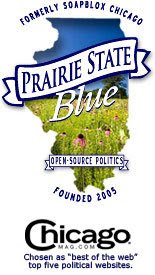From page 6 of the Tribune (emphasis added):
In an apparent reversal of decades of U.S. practice, recent federal Office of Foreign Assets Control regulations bar American companies from publishing works by dissident writers in countries under sanction unless they obtain government approval.Apparently the Bush administration want to apply their much beloved free-market principles to Social Security, but not to petty trifles like books and ideas.
The restriction, condemned by critics as a violation of the 1st Amendment, means that books and other works banned by some totalitarian regimes cannot be published freely in the United States, a country that prides itself as the international beacon of free expression. ***
Violations carry severe reprisals--publishing houses can be fined $1 million and individual violators face up to 10 years in prison and a $250,000 fine. ***
The regulations have led publishers to scrap plans for volumes on Cuban architecture and birds, and publishers complain that the rules threaten the intellectual breadth and independence of academic journals. ***
In a further wrinkle, even if publishers obtain a license for a book--something they are loath to do--they fear the regulations bar them from advertising it. ***
Officials from the U.S. Treasury Department, which oversees OFAC, declined to comment on the lawsuit, but spokeswoman Molly Millerwise described the sanctions as "a very important part of our overall national security.""These are countries that pose serious threats to the United States, to our economy and security and our well-being around the globe," Millerwise said.













No comments:
Post a Comment